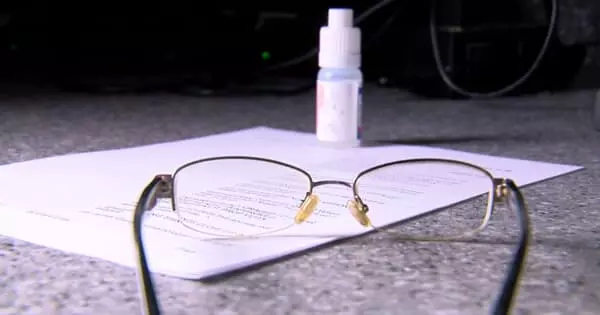The Food and Drug Administration approved eye drops in October that could potentially replace reading glasses for millions of people, and they hit the market this week. The drops, known as pilocarpine and marketed as Vuity by pharmaceutical company Allergan, could help some 128 million Americans who are farsighted. According to the company, one drop in each eye can improve close-up vision for six to ten hours, according to CBS News. The drops work by utilizing the eye’s natural ability to reduce the pupil size.
Vuity, which received FDA approval in October, could potentially replace reading glasses for some of the 128 million Americans who have difficulty seeing close-up. According to the company, the new medicine takes effect in about 15 minutes, with one drop on each eye providing sharper vision for six to ten hours.
“Reducing the pupil size expands the depth of field or the depth of focus, and that allows you to naturally focus at different ranges,” George Waring, principal investigator of a 750-person clinical trial for the drug, told CBS.
Vuity is the first FDA-approved eye drop to treat presbyopia, or age-related blurry near vision, the prescription drug makes use of the eye’s natural ability to reduce pupil size. Reducing the pupil size expands the depth of field or the depth of focus, and that allows you to naturally focus at different ranges.
George Waring
Presbyopia is a natural part of the aging process, and the first time you look in the mirror with your reading glasses on is a good reminder to get your affairs in order. A new eye drop medication, however, promises to delay the inevitable for a little longer.
Prescription medication that is new Vuity is administered to the eyes once daily, and its active ingredient pilocarpine is intended to stimulate the eye to reduce pupil size, an effect that should last the majority of the day. As any photographer who has ventured out of automatic mode will attest, decreasing the size of the pupil increases the depth of field of an image, which means that more of it should look sharp wherever the lens is focused. This is why pinhole cameras produce sharper images than hole-punch cameras.

At $80 for a 30-day supply, the drops aren’t the cheapest, but they’re also not the most expensive. It is not, however, a miracle drug. Headaches and red eyes have been reported as side effects. The company also warns against using the drops while driving at night. The drops are also mostly effective for people in their forties and fifties. According to CBS, those over the age of 65 will be less affected. The value proposition is one of convenience — wearing reading glasses can be inconvenient for millions of people, so getting rid of them is appealing.
Toni Wright, a trial participant, told CBS, “It’s definitely a life changer.” “I wouldn’t need my readers as much, particularly on the computer, where I would always need them on.”
Vuity is the first FDA-approved eye drop to treat presbyopia, or age-related blurry near vision. According to Dr. George Waring, the trial’s principal investigator, the prescription drug makes use of the eye’s natural ability to reduce pupil size.
“Reducing the pupil size expands the depth of field or depth of focus, which allows you to naturally focus at different ranges,” he explained. A 30-day supply of the drug will cost around $80 and works best in people aged 40 to 55, according to a Vuity spokesperson. According to the company, headaches and red eyes were among the side effects observed during the three-month trial. “We anticipate that this will be well tolerated in the long run, but it will be evaluated and studied in a formal capacity,” Waring said.
Vuity is not a panacea, and the manufacturer warns against using the drops while driving at night or performing activities in low-light conditions. The drops are intended for mild to moderate cases and become less effective after the age of 65, as the eyes age. Users may also experience temporary difficulty adjusting focus between near and far objects.
The drug is currently not covered by insurance. Doctors who spoke with CBS News said it’s unlikely insurance will ever cover it because it’s not “medically necessary,” and glasses are still a cheaper option. The new drug is an easy backup solution with a clear advantage for Wright and millions of others like her. “It’s just a convenience to be able to put the drops in and go,” she explained.















